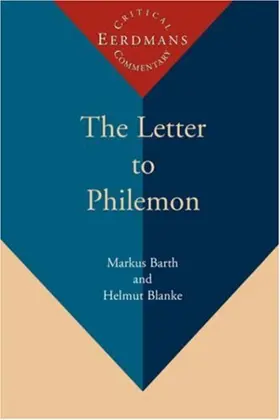

The Letter to Philemon
in Eerdmans Critical Commentary
Pages
580 pages
Publisher
Eerdmans
Published
2000
ISBN-13
9780802827456
Although sometimes regarded as trivial because of its brevity or its treatment of issues distant from the modern world, the letter to Philemon remains valuable both for its insight into the social setting of the New Testament and for its reiteration of a central component of the gospel—brotherly love.
This superb new commentary in the ECC series is unique for its exhaustive study of the ancient world at the time Philemon was written. The volume examines the institution of slavery in Paul’s day, drawing on secular sources from Greece and Rome and from Christian writers of the time. The references to slavery found in Ephesians, Colossians, and 1 Timothy are also compared and contrasted with Paul’s words in Philemon.
In addition, the verse-by-verse commentary focuses on important themes in Pauline theology, including love, faith and faithfulness, church unity, providence, free will, and human responsibility. Markus Barth makes his exposition even more useful by surveying the history of the interpretation of Philemon, from the patristic age to modern liberation theologians.
The product of Barth’s lifelong research and completed by Helmut Blanke, this volume will become the standard work on Philemon.
Collections
This book appears in the following featured collections.
- Favorite Advanced NT Commentaries by Jeremy Pierce (parableman)
- Best Exegetical Commentaries by Jim Rosscup
- New Testament Commentaries & Monographs by Princeton Theological Seminary
- Recommended New Testament Commentaries for Evangelical Pastors by Thomas R. Schreiner
Reviews
This commentary likely holds the record for the largest commentary on the smallest book in the modern era. Barth and Blanke wrote the Anchor Bible commentary on Colossians and Markus Barth is responsible for the idiosyncratic two-volume Anchor commentary on Ephesians. Philemon has 330 words, this commentary has just under 500 pages, or about a page and a half for every word in the letter.
Actually, the commentary has 242 pages of introduction. Barth and Blanke begin with about 100 pages on slavery in the first century. This is practically a book in and of itself, but understanding this material is essential for properly understanding the letter, and more importantly, understanding why Paul does not request that Philemon give Onesimus his freedom. I have commented several times that one of the problems understanding slavery is that most people in the Western world have American slave trade in mind, but that is not at all what Roman slavery was like.
The second half of the introduction treats the more typical topics one expects to find in a commentary. A major concern in the type of letter and the rhetoric Paul uses to achieve his goal. In fact, Paul’s goal in the letter is not obvious unless we read the letter as an example of a Greco-Roman letter. Barth and Blanke provide a number of parallel letters from the Greco-Roman world which help illuminate Philemon. The main concern of the introduction is the situation behind the letter to Philemon. Much is assumed about Onesimus, his flight and theft, his conversion and the reasons for his return.
The actual commentary on Philemon proceeds phrase-by-phrase, treating the English text. All Greek appears in transliteration and all sources are cited in-text. This commentary is less interested in lexical issues, but that may be a result of the fairly straight-forward Greek found in the letter. The commentary also includes twenty-two excursuses on a variety of topics from house churches to providence and free will. Most of these run only a few pages and can be skipped if desired. The excursus on brotherhood (p. 423-46) is the longest. Barth and Blanke survey the Old Testament background for this term and compare Paul’s use of brother language for fellow believers to other “brotherhoods” in the ancient and modern world.
Something I find strange with this commentary is that it does not have an introduction or forward. I was interested to know how Blanke completed the work of his teacher Barth (who died in 1994).
[Full Review]
Massive commentary on Paul’s shortest epistle, by Karl Barth’s son.
[Full Review]
Who would have thought that a commentary on Philemon could run almost 600 pages? It's almost overwhelmingly thorough in some respects. The opening discussion on slavery is extremely helpful and more detailed than what most commentaries give. Includedin the commentary section are 20+ excurses, which probably would have been better included in a separate section because they often interrupt the flow (seriously- 23 pages is not an excursus, it's an article). Most interpretations are surveyed and sifted, though the authors tend only to make cautious affirmations of a position when they are not sure (such as where Paul was when he wrote this letter). Chances are most pastors won't fork over this kind of money for a Philemon commentary. If you are studying slavery in the NT period or teaching in depth in Philemon (or other places where slavery is present in the biblical text), then you ought to consult this commentary. If you are looking for a stand alone volume on Philemon, I would still go with Fitzmyer- for a lot less money.






